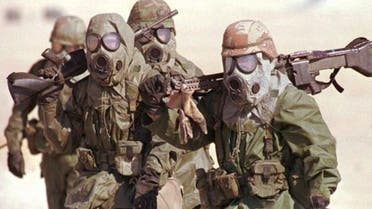‘I look forward to dying:’ U.S. veteran fights Gulf War syndrome
25 years on, health consequences post the Gulf War still felt by U.S. veterans and Iraqis
Glenn Stewart, a U.S. veteran of the first Gulf War a quarter of a century ago, has a deadly dilemma.
Stewart, who served as a communication specialist in the U.S. forces tasked with taking back Kuwait from the clutches of Iraqi dictator Saddam Hussein in 1991, wants to see his grandchildren grow.
But at the same time, he also waits daily to hear the “good news” of his impending death.
The 54-year-old suffers from what is commonly known as Gulf War syndrome (GWS) or Gulf War Illness (GWI), a cocktail of ailments. Its multiple symptoms are both physical and psychological - chronic fatigue, insomnia, neurological problems, and extreme levels of stress.
It is not that I will commit suicide or want to die, but I look forward to dying because it will end my daily pain and torture
Glenn Stewart, a Gulf War U.S. veteran, who suffers from GWI
“I do want to live long to see my grandchildren grow up and graduate high school, but I am hoping for the good news from a doctor that I will die soon,’” Stewart told Al Arabiya News.
Stewart argued this “sounds irrational and insane to normal everyday people,” but said other veterans would be able to relate.
“It is not that I will commit suicide or want to die, but I look forward to dying because it will end my daily pain and torture,” he lamented.
The veteran described the pain suffered by those with GWI as “extreme,” with some of them taking their own lives as they can no longer tolerate its toll.
Another Gulf War veteran, Richard F. Christense, who currently lives in Germany, complained about his inability to sleep. “[Only] every four days I can sleep. I am always tired,” he said.
The 51-year-old Christense, who described his “bad nerves” as “rattled,” rejects taking sleep pills and is trying his best follow to combat his symptoms with a healthy lifestyle.
But GWI does not present a consistent cluster of symptoms and can be difficult for doctors to fully diagnose, according to the Veterans Law and Benefits blog, propelling the Veteran Affairs Department (VA) to continually designate it as “undiagnosed illness and medically unexplained chronic multi-symptom illness.”
“I had been fighting with the Veterans Affairs (VA) for about 5 years trying to get help and I was kept being told that my problems were mental in nature and stress related,” Stewart said. “I have been advocating for some years now on reform of the VA to have them follow the law.”
If a veteran is diagnosed with a presumptive condition, he or she is then entitled to medical or disability benefits associated with the diagnosis.
“The bottom line is we seek justice and to help many of those like me who are extremely sick and dying,” Stewart said.

While suggested causes for GWI included depleted uranium, sarin gas, smoke from burning oil wells, vaccinations, combat stress and psychological factors, veterans also blame a mixture of injections and pills – which were originally supposed to protect them against chemical attacks.
In the UK, one of the biggest partners in the U.S.-led Gulf War coalition, 50,000 British servicemen and women blame these injections and pills for their current health issues.
“I took stuff so my body does not react to anthrax and all others mustard gas and whatever the Iraqis might use against us,” Christense, who was specialized in communication, artillery field, sid. “Basically, we took all kind of stuff, like experimentation.”
Stewart also cited a story of betrayal during the time “when Iraqi forces used chemical and biological weapons” against U.S. troops.
“Our chemical alarms were continually going off, but we were being told by higher command that those were false alarms,” he said.
The former head of the Pentagon’s Depleted Uranium Project, Doug Rokke, who become a U.S. army whistleblower, blamed these toxic exposures on the “deliberate actions” of the U.S. military in an address he gave in 2003.
Rokke said that “Department of Defense officials still claim that alarms were all false alarms.”
Citing the memoirs of U.S. top General Norman Schwarzkopf, Rokke said that the military had taken the fateful decision of blowing up Iraq’s stockpiles of chemical and biological weapons with air strikes and artillery fire.
Like his colleagues who were dispatched from green Germany to Iraq, Christense did not receive proper training in a desert environment, leading him at the time to believe that the weapons used were “mini nukes.”
“When I went to Iraq just to observe, I saw an Iraqi soldier. One half of him was normal but other half was a skeleton… ash, that is not normal. It means that the arms used were hotter than the sun, and basically it was a mini small nuclear bomb,” he said, reaffirming that “moisture was turned into dust.”
He added: “We were never told what was going on, there is a lot of mind games.”
The Gulf War saw the first use of depleted uranium by Allied forces, exposing both Gulf War veterans and Iraqis to long-term health consequences.
Experts believe the 350 tons of depleted uranium used in the Gulf War by Allied forces have led to high rates of cancer and congenital birth defects in Iraq. In 2014, the Department of Veterans Affairs rejected links between Gulf War service and cancer.
But the year before, several former U.N. and WHO officials claimed there was political interference to suppress scientific evidence of the post-war environmental health catastrophe, UK paper The Guardian reported at the time.
The lack of acknowledgement of the lethality of arms used in the Gulf War meant that current sufferers must depend on themselves for much of their treatment.
In a previous interview with Al Arabiya News, Yahya al-Nasiri, governor of the southern Dhi Qar province, said Iraq was studying new plan on where to bury its piles radioactive waste, which “exacerbated people’s health including high rates of cancer.”
“The U.S. army unfortunately caused an increase in these radioactive material by using uranium and its advanced arms that use a lot of harmful radioactive material,” Nasiri said. “But the U.S. army did not help nor support our projects to get rid of these pollutants.”

-

Top 21 faces of the Gulf War
1. Saddam Hussein Iraq’s late President Saddam Hussein invaded Kuwait in ... Featured Perspectives -

Lessons from the Gulf War: defeating ISIS
In contrast to the Gulf War’s victories, U.S.-led efforts to defeat ISIS have ... Middle East Opinion -

Timeline: Gulf War 1990-1991
Al Arabiya News looks back at the Gulf War 25 years on Featured Perspectives -

Most iconic Gulf War images
Al Arabiya looks back at the key moments that marked Iraq's invasion of Kuwait Perspective -

Fundraiser for first Gulf War memorial in U.S. launched
Desert Storm/Desert Shield is the largest American war of the 20th Century ... Variety -

Syria foreign minister in first visit to Gulf since conflict: Media
Syria’s Foreign Minister is to head to Oman on Thursday in his first visit to a ... Middle East -

GCC to ‘aid’ Yemen reconstruction
Separately, Yassin compared the situation in Yemen to that of Kuwait in 1990 ... Middle East -

Iraq requests one-year deferral on Gulf War reparations
Kuwait and major powers on the ruling body of the U.N. Compensation Commission ... Middle East -

Kuwait accepts Iraq Gulf war pay delay
The U.N. Gulf war compensation fund agreed to postpone Iraq's payment Middle East -

Kurds dream of independence as they defend perilous border
The Kurds have enjoyed de facto self-rule since the first Gulf War in 1991 Analysis -

After eight decades, Arab poet Khalil Gibran’s writings live on
Beatle John Lennon, Rock and Roll King Elvis Presley and U.S. Gulf War General ... Art and culture
